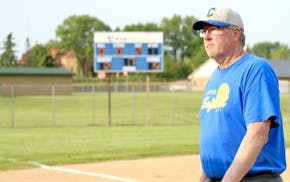That's enough talk about the problem of under-representation.
Now it's time for African immigrants and other minority groups — who are on pace to become the new majority in Brooklyn Park — to step up and take leadership roles on local park boards, PTAs, philanthropic groups, city commissions and local governments. It's time to use their growing population numbers and increasing clout to move from civic spectators to policymakers.
That was the message at the "Civic Engagement Conversation" at Brooklyn Park City Hall. More than 300 people packed the City Council chambers last Thursday evening. Every chair was full and a standing crowd lined the walls as city staff scrambled to set up overflow rooms.
The mayors from Brooklyn Park and Brooklyn Center greeted the gathering before the crowd broke off in small groups to discuss why immigrant and minority groups are underrepresented in local government and other agencies and how to change it.
"It is time to move out of isolation and take action on issues that affect them. We have to shift our role from mere observers to active participants," said Abdullah Kiatamba, executive director of the nonprofit African Immigrant Services, which hosted the event. "If you really care, what are you willing to do?"
Brooklyn Park, a city of 77,000, is nearly 50 percent minority. About 21 percent of the city is foreign-born. Brooklyn Center, a city of 30,000, is about 55 percent minority, according to U.S. Census data. About 23 percent of its population is foreign-born.
The goal of the meeting is twofold: to create some standing groups of people interested in different areas, including education, housing and public-police relations, and to spur members of the community to take more roles on boards, committees and in government, Kiatamba said. "We will create a circle of community that will last after the event," he said. "We want partnerships across race and culture."
In one small-group discussion, people listed universal reasons why immigrants and minority groups have not taken a more active role in civic life. It included hectic schedules juggling family and work commitments and the perception that a lone voice will not be heard.
Kiatamba said it can also be intimidating for some immigrants to step forward and join civic life.
"I think another issue is trust based on poor experiences in the past or distrust in government in general," said Elizabeth Tolzmann, Brooklyn Park's community engagement coordinator
Many at the event expressed a desire to see more action and less talk.
"I don't want to talk about the achievement gap. I just want to do something about it," said Frances Woodson, a Minneapolis education consultant.
At the meeting, some participants said it's also time to address tensions between African immigrant communities and African-Americans.
"It's time for the African and African-American communities to enter into a greater dialogue. We share more similarities than differences," said the Rev. Jerry McAfee of New Salem Baptist Church in Minneapolis. "We need to have a serious conversation about how we can help each other."
Like many at the event, McAfee said this movement to increase minority civic involvement has to push past conversation into action mode.
"Starting a conversation is always important, but if it ends at talking, it's to no avail," said McAfee, who lives in Brooklyn Park.
African Immigrant Services partnered with the Diversity and Equity Department of North Hennepin Community College, the city of Brooklyn Park's Diversity Team, and the Northwest Civic Engagement Coalition to make the event happen.
Shannon Prather • 612-673-4804
Man agrees to 6-year sentence for fatally shooting Hopkins man on edge of downtown Minneapolis

Softball coach, with record delayed but not denied, keeps winning
Ludacris and T-Pain to stand up together at Minnesota State Fair grandstand in 2024
13-year sentence for man who fatally hit other driver while fleeing police in Oakdale

